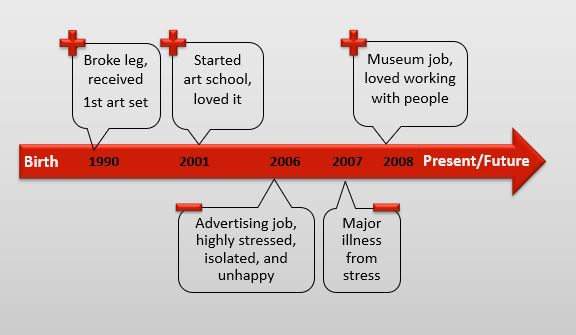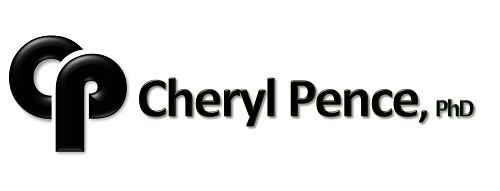
Using Past Experiences to Create a Future Life You Love
A lifeline is a visual representation of your experiences over the course of your life. Creating a lifeline can get you thinking about the experiences and choices that have affected your life and career development. It is a helpful way to gain perspective on your past and determine where you may want to aim for your future.
Chart Your Past Experiences
Start with a line depicting your life chronologically, birth is on one end and a present or future date is at the other. The line can be horizontal or vertical, that is up to you and how you want to chart out your life story. Now on this line, identify key highlights that were most significant to you throughout your life. They should include positive and negative events that impacted you.
If you are focusing mainly on the interactions of career, you may want to pay special attention to any significant points that have influenced you and your decisions related to your career. These could be areas where you worked, volunteered, helped others, or in some way contributed to your career choices. If you want to examine another theme, like your relationships, hobbies, or other areas, you can focus on those influences more.
For example, if you are an artist or aspire to be one, you may find that the summer you broke your leg and were stuck inside was actually a positive highlight because you received a new art set or devoted most of your time to sitting at the kitchen table painting. If art is not in your current career aspirations, something like that probably would not have stood out to you.
Another example might be that if you wanted to be a pilot, think about what sparked that interest. Was it a movie, watching planes fly over your house, or having the opportunity to fly with someone you knew? I know in the mid-1980s, the movie Top Gun was instrumental in getting a lot of people interested in naval aviation. It may have even sparked my own interest in joining the Navy a few years later.
Make Connections between Events
After you charted the most significant events in your life, go back through and annotate times that were most positive (+) or negative (-). Since we know that our careers can impact our well-being in many areas of our lives, note when things were going really well in any area. For example, you loved your career, had great relationships, felt super healthy, or other positives. Conversely, note when things were not going so well; your career was not fulfilling, your relationships were rocky, or you were not healthy in some way. Sometimes you may notice that the high or low points for your career, relationships, and health occurred at the same time. That may indicate that your career could have positively or negatively impacted your relationships and well-being or the other way around.
Now step back and notice the trends across your positive or negative experiences. For example, you may have had more positive experiences when you were working with people and more negative experiences when you were stuck at a computer by yourself. Or vice versa; maybe you preferred working on your own and not with people. Looking at these trends across time can help you identify the things that you loved about your career and those that you did not. This can help you more easily pinpoint what you want or do not want in your current or future career experiences.
For some people, your real experiences can be more powerful than just evaluating your interests and preferences. For example, as a teenager, I loved animals and thought I wanted to be a veterinarian. Thankfully, my dad encouraged me to work with a veterinarian during my senior year in high school before pursuing that in college. I found that although I loved being around animals, the medical field in any capacity was not something I could stomach; therefore, it was not something I wanted to pursue.
Like me, if you notice that most of your positive experiences involved times when you worked with people, or a certain group of people, you may want to write that as a significant factor in your career happiness. Do the same with the negative experiences and identify things that you do not want in your life or career. Then expand your lifeline into the future and identify all the positive experiences that you would like to have. Most likely, they will include the positive aspects you just identified. Then reflect on your life line:
- What were the significant points that influenced you?
- Who were the key people who influenced your decisions?
- What themes might you take from your lifeline?
- Was there a focus more on data, ideas, things, or people?
- How might your experiences affect your work with a client?
- How might the client’s experiences affect you?
- Has this helped you in understanding the career choices you made?
Apply the Insights to an Ideal Future Career or Life
Then most importantly, take action. Find a way that you can incorporate more of these positive experiences into your life now or in the near future. If you enjoy your current job, are there experiences that could add to that? If you are no longer satisfied with your current job, relationships, or hobbies, are there ways you may introduce some of these more positive experiences into your life to increase your satisfaction? If you are ready to make a change in your career or life, how can you find a new area that incorporates many of the positive aspects you want to experience in your future? Asking yourself these questions can help you determine the ways that you can take action today.
Now, go and do it… fill your life with more positive career, relationship, and wellness-producing experiences! This lifeline process can be beneficial by using your past experiences to create a future career you love!
- What did you discover about yourself?
- Can you see how your values, interests, personality, and skills were shaped from the events in your life?
- How do you think your life events have shaped your desired future experiences?
- How are you taking action to get more of what you want in life?
